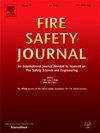Beyond the worst-case scenario: Inconsistencies in dust flammability parameter determination for organic solid fuels
IF 3.3
3区 工程技术
Q2 ENGINEERING, CIVIL
引用次数: 0
Abstract
The use of solid organic fuels is expected to continue increasing during the near future, requiring bigger facilities and storage units. It is known that one of the main risks associated to these materials is the risk of fire and explosion. While flammability parameters and testing standards have been adapted from fossil fuel research, these adaptations often fail to account for the unique properties and behaviour of organic dusts. This study aims to critically evaluate the applicability of current flammability testing standards to organic solid fuels, identify inconsistencies in parameter determination, and propose improvements to enhance safety assessments. Special attention is given to the influence of particle size, moisture content, and composition on ignition sensitivity. A comprehensive literature review was conducted alongside experimental thermogravimetric analysis (TGA) of wood pellet dusts under varying conditions. The study examined how methodological variables (such as crucible size, heating rate, and gas atmosphere) affect thermal decomposition profiles and ignition-related parameters. The results reveal that current standards often overlook critical variables such as sample preparation, dispersion method, and equipment configuration, leading to inconsistent or non-representative results. TGA parameters like maximum weight loss temperature and induction temperature were found to be sensitive to test conditions. The study underscores the need for more detailed and standardized testing protocols tailored to organic dusts. It advocates for a shift beyond worst-case scenario assumptions toward more realistic, scenario-specific assessments. These improvements are essential for enhancing the reliability of flammability data and ensuring safer industrial practices involving combustible dusts.
在最坏的情况之外:有机固体燃料的粉尘可燃性参数测定不一致
预计在不久的将来,固体有机燃料的使用将继续增加,需要更大的设施和储存单元。众所周知,与这些材料相关的主要风险之一是火灾和爆炸的风险。虽然可燃性参数和测试标准已经从化石燃料研究中调整,但这些调整往往无法解释有机粉尘的独特性质和行为。本研究旨在批判性地评估当前可燃性测试标准对有机固体燃料的适用性,识别参数确定中的不一致之处,并提出改进措施以加强安全评估。特别注意的是颗粒大小,水分含量和组成对点火敏感性的影响。对不同条件下木屑粉尘进行了全面的文献综述和实验热重分析(TGA)。该研究考察了方法变量(如坩埚尺寸、加热速率和气体气氛)如何影响热分解剖面和点火相关参数。结果表明,目前的标准往往忽略了关键变量,如样品制备、分散方法和设备配置,导致结果不一致或不具有代表性。最大失重温度和感应温度等TGA参数对试验条件比较敏感。这项研究强调需要针对有机粉尘制定更详细和标准化的测试方案。它提倡从最坏情况的假设转向更现实的、具体情况的评估。这些改进对于提高可燃性数据的可靠性和确保涉及可燃性粉尘的更安全的工业实践至关重要。
本文章由计算机程序翻译,如有差异,请以英文原文为准。
求助全文
约1分钟内获得全文
求助全文
来源期刊

Fire Safety Journal
工程技术-材料科学:综合
CiteScore
5.70
自引率
9.70%
发文量
153
审稿时长
60 days
期刊介绍:
Fire Safety Journal is the leading publication dealing with all aspects of fire safety engineering. Its scope is purposefully wide, as it is deemed important to encourage papers from all sources within this multidisciplinary subject, thus providing a forum for its further development as a distinct engineering discipline. This is an essential step towards gaining a status equal to that enjoyed by the other engineering disciplines.
 求助内容:
求助内容: 应助结果提醒方式:
应助结果提醒方式:


